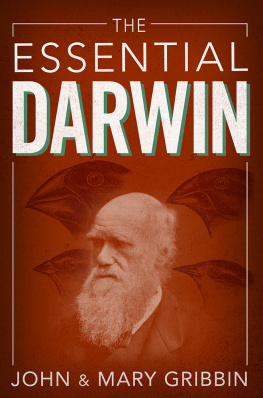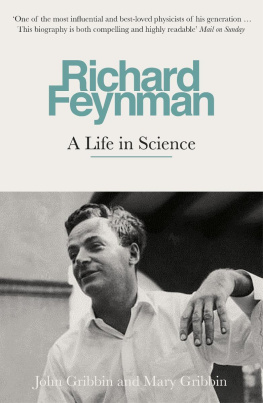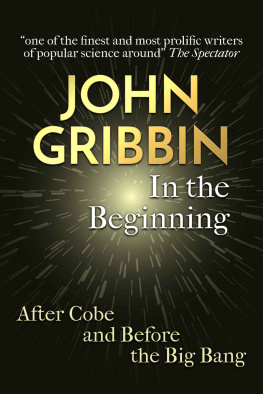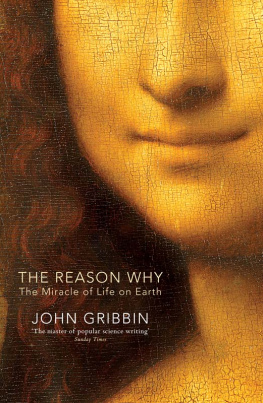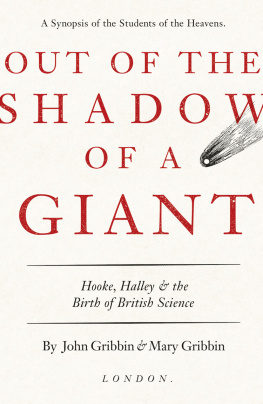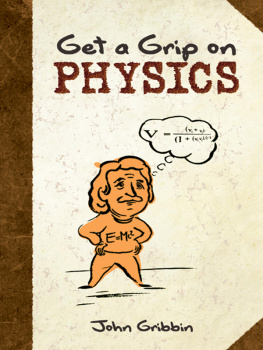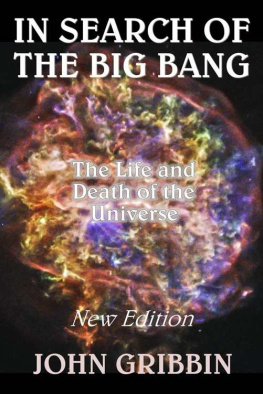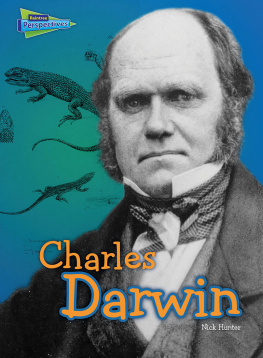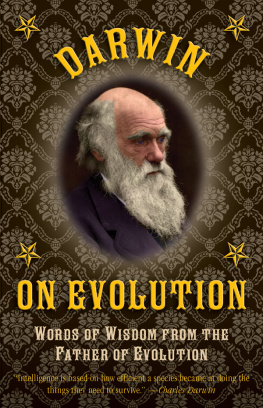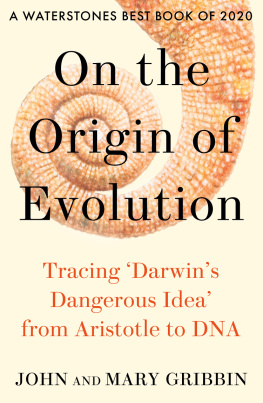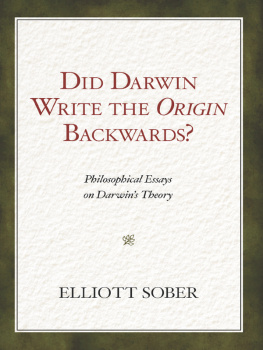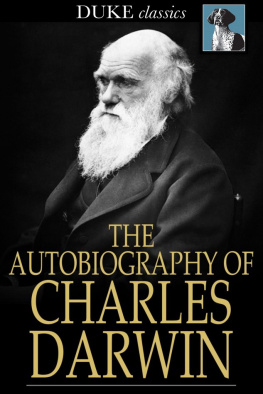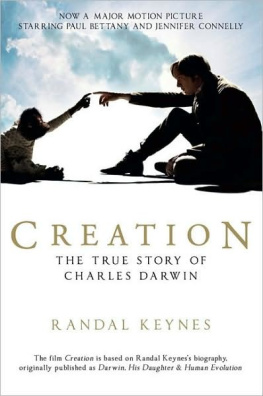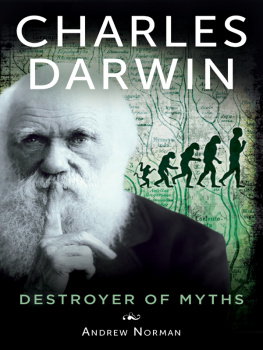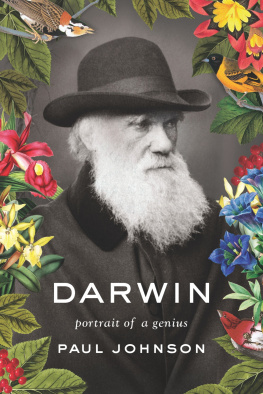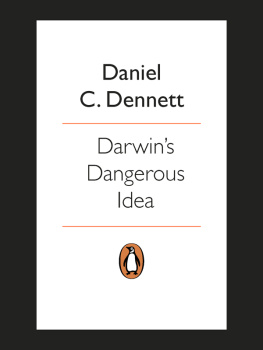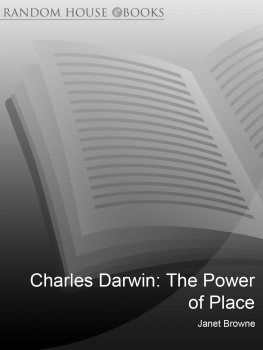THE ESSENTIAL DARWIN
In the same series by the same authors:
Curie in 90 minutes
Einstein in 90 minutes
Halley in 90 minutes
forthcoming titles
Faraday in 90 minutes
Galileo in 90 minutes
Mendel in 90 minutes
Newton in 90 minutes
John and Mary Gribbin
The Essential Darwin
Constable London
First published in Great Britain 1997
by Constable & Robinson Ltd.
5556 Russell Square
London WC1B 4HP
www.constablerobinson.com
Copyright John and Mary Gribbin 1997
The right of John and Mary Gribbin to be identified
as the authors
of this work has been asserted by them
in accordance with the Copyright,
Designs and Patents Act 1988
ISBN 0 09 477050 6
eISBN 978 1 47 211603 1
Set in Linotype Sabon by
Rowland Phototypesetting Ltd,
Bury St Edmunds, Suffolk
Printed in Great Britain by
St Edmundsbury Press Ltd,
Bury St Edmunds, Suffolk
A CIP catalogue record for this book
is available from the British Library
Cover copyright Constable & Robinson.
Contents
Darwin in context
Charles Darwin did not invent the idea of evolution, which had grown steadily from the sixteenth century onwards as scientific learning developed in Europe. His important contribution was to offer an explanation of how evolution works natural selection. Even here, though, he was not unique, as we shall see. Darwins rare value was in the breadth of his learning; the way in which he applied the scientific method to all his work, leaving no room for wishful thinking; and the clarity and beauty of his writing, which got his message across (and still does) to a wide audience. More than for any other great scientific advance, it is still true to say that the best way to learn about evolution is to read the original works of the scientist who put the idea forward.
What you might call evolutionary ideas (though rather strange ones) about how the living world got to be the way it is can be traced to the time of the ancient Greeks. We pick up the story with Francis Bacon (15611626), who, in his book Novum organum published in 1620, wrote about the way in which species vary naturally from one generation to the next. He pointed out that such natural variation could be used by the breeders of plants and animals to produce many rare and unusual results. In Germany, Gottfried Wilhelm Leibniz (16461716), best remembered as a mathematician, was intrigued by fossils and by the possible relationship between the extinct ammonites and living species such as the nautilus. Speculating that the species had changed because the modern variety lived in a different environment from their ancestors (he did not actually use the word evolved; the term evolution was first used in its modern biological context in 1826, by Robert Jameson), he wrote, it is credible that by means of such great changes [of habitat] even the species of animals are often changed.
In the seventeenth century, this was by no means an isolated view. In the eighteenth, Georges Louis Leclerc, Comte de Buffon (170788), puzzled over the geographical distribution of similar but different species, and suggested that the North American bison might be descended from an ancestral variety of ox that had migrated there, where they received the impressions of the climate and in time became bisons. Such ideas implicitly include not only the concept of evolution, but also the notion that species have evolved to fit their environments adaptation.
The greatest of Darwins predecessors as an evolutionary thinker, though, was his grandfather Erasmus Darwin (17311802). A larger-than-life figure, he was a doctor good enough to be asked by George III to become his personal physician (though he did not take up the post), a poet good enough to be considered a candidate for Poet Laureate (though he just missed out there) and a natural philosopher good enough to be elected a Fellow of the Royal Society (though his most important piece of scientific work now bears someone elses name). Erasmus combined several of his interests by writing about evolution in a long erotic poem, The Botanic Garden, as well as in a two-volume prose work, Zoonomia, published in 1794 and 1796, more than ten years before Charles Darwin was born.
Erasmus Darwin was clear about the importance of evolution, but mistakenly thought that individual members of a species developed different characteristics during their lifetime, and these enhanced characteristics were passed on to their offspring. In his picture, for example, if a deer needs to run away from a predator to avoid being killed, it will somehow acquire a body slightly better adapted to running more or less by willpower and pass that slightly improved body plan on to the next generation through heredity. The same process, repeated over very many generations, then explains why deer are such good runners today.
Curiously, almost exactly the same idea was developed independently in France by Jean-Baptiste Lamarck (17441829), who published it in 1801. Lamarck was a full-time scientist, Professor of Zoology at the Museum of Natural History in Paris, and developed the idea much further, so it is perhaps just that it should be known today as Lamarckism (it would certainly be confusing if it were called Darwinism!). What is less just is that it is often derided as a silly idea, when in fact it was for its time a respectable attempt to put evolution on a scientific footing, and helped to stimulate discussion about the concept of evolution.
Lamarcks ideas were taken up by his discipline tienne Geoffroy Saint-Hilaire (17721844), who not only promoted them but made the first clear statement of what we would now call the survival of the fittest. Writing in the 1820s about the kind of modifications to an individual that Lamarck (and Erasmus Darwin) had described, he said:
If these modifications lead to injurious effects, the animals which exhibit them perish and are replaced by others of a somewhat different form, a form changed so as to be adapted to the new environment.
Unfortunately, Geoffroy Saint-Hilaire also had some distinctly barmy ideas about the relationships between species: among other things, he tried to prove that the body plan of a mollusc is the same as that of a vertebrate. This led to all his ideas being judged out of court, and by 1830 Lamarckism, tarred with the brush of Geoffroy Saint-Hilaire, was no longer seen as respectable science in France. In England, hardly anyone knew of Erasmus Darwins thoughts on evolution. But the young Charles Darwin was on the brink of his greatest adventure. It would be almost thirty years before the fruits of that adventure were presented to an astonished public. But though the public was astonished when the Origin of Species was published in 1859, the scientific world ought not to have been. Indeed, had it not been for Geoffroy Saint-Hilaires excesses, the modern version of the theory of evolution by natural selection might well have been developed from Lamarcks work in France, while Charles was still at sea on board the Beagle.
Life and work
We have already introduced one of Charles Darwins grandparents, so we may as well flesh out his family background by introducing the others. Erasmus, as we have seen, was a successful country doctor. He lived near Shrewsbury, not far from the heartland of the Industrial Revolution in England. He was born in 1731, and became a gentleman amateur in science and the arts, wealthy and influential in science, literature and society. He was also a huge man physically, with large appetites, addicted to lifes pleasures including food, wine and women. His first wife, Mary, died of drink in 1770 at the age of 30, having produced five children; the third of these, Robert Waring Darwin (born in 1766), would become the father of Charles.
Next page
